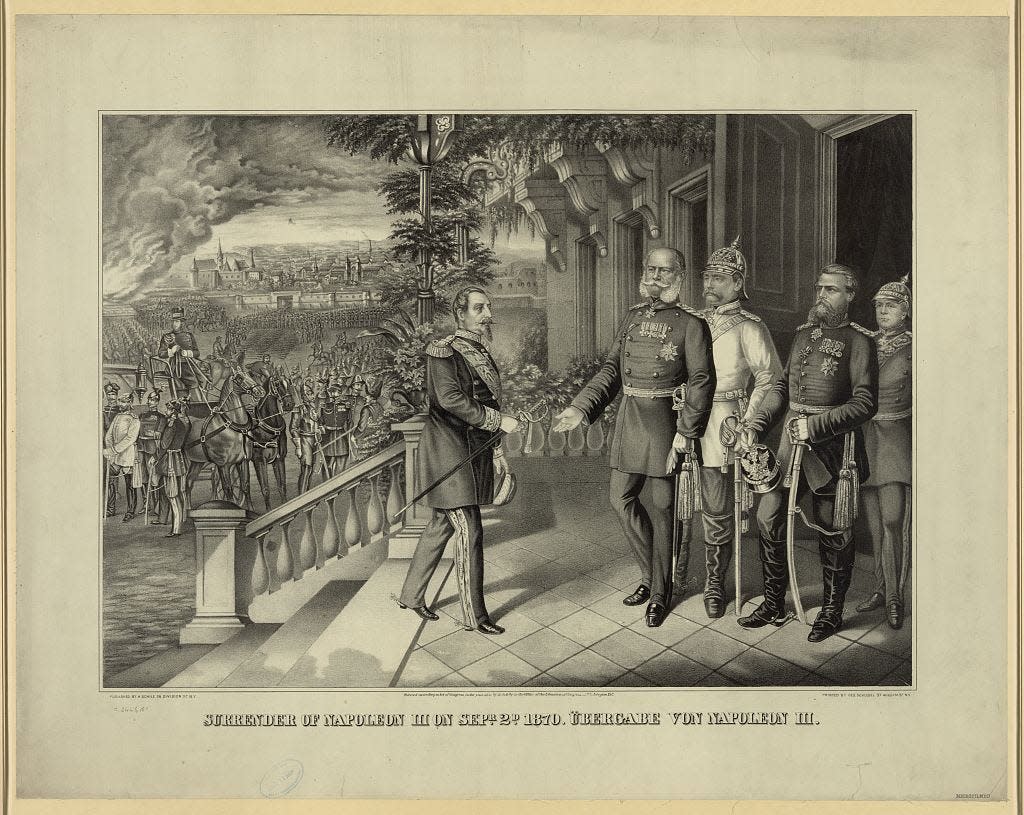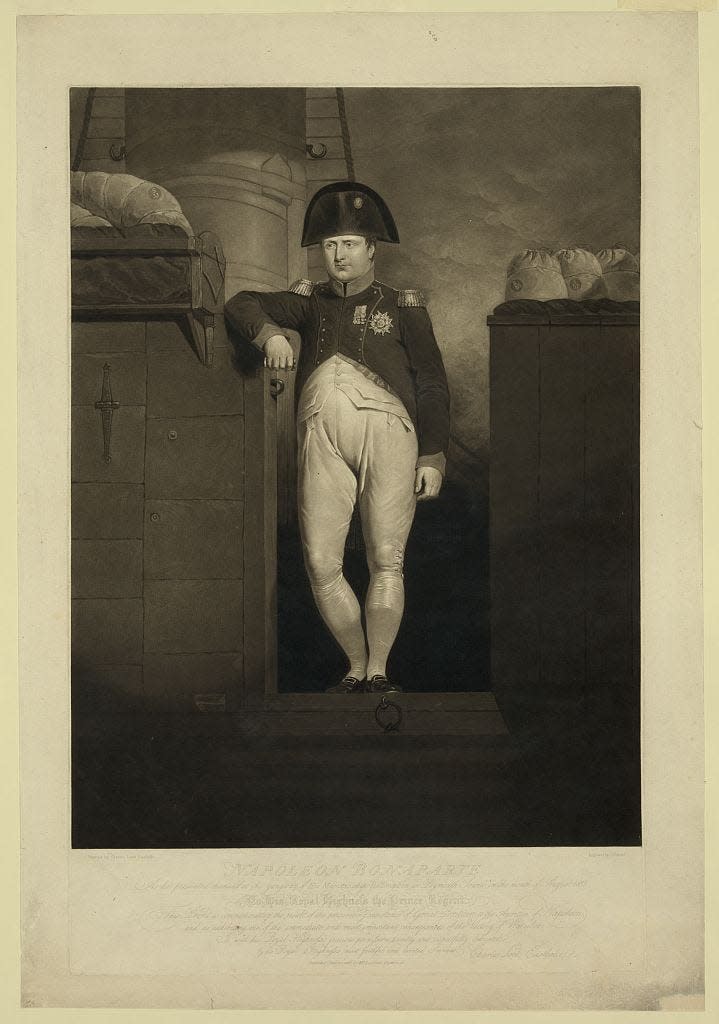The Monday After: Remembering Napoleans in the news

- Oops!Something went wrong.Please try again later.
The news reported in the Canton Repository And Republican 150 years ago was positioned less than prominently, when considering its subject's status in world history.
It was printed in pieces only a single column wide, halfway down the front page of the newspaper's Jan. 17, 1873 edition.
"Death of Napoleon," a headline over the story said, with a dateline revealing the first part of the news had come from London on Jan. 8.
"Napolean III died at twelve twenty-eight today," the single sentence report said.
A second portion of the report was datelined "NEW YORK, January 9," and it gave readers details of the death of Charles Louis Napoleon Bonaparte – Napoleon III – the first president of France from 1848 to 1852 and the last monarch of that country as emperor from 1852 to 1870.
"The news of the death of Emperor Napoleon, which was received in this city before nine o'clock this morning, was not entirely unexpected from the tone of the dispatches received yesterday," the article reported. "It is seldom that a man at the advanced age of Napoleon (he being now 65) has recovered from such illness.
"Many have wondered that the ex-Emperor allowed himself to undergo the series of operations which have thus resulted in his death."
The death of the former French leader was significant news in its own right.
Still, Napoleon's passing took on additional significance to those studying the history of the Repository. It brought to mind previous news coverage of a Napoleon. Decades before, not long after the newspaper's founding, it had reported on Napoleon III's uncle, Napoleon I – Napoleon Bonaparte.
The defeat of that elder Napoleon at the Battle of Waterloo on June 18, 1815, was the first major news event covered in The Ohio Repository by the newspaper's founder John Saxton. A story about Napoleon's loss in the fighting appeared on Page 3 of the Aug. 17, 1815, Repository.
The fact that news of the battle was published weeks after the battle had concluded can be forgiven. The delay was not editor Saxton's fault. Details of Napoleon's defeat were carried a great distance on horseback, aboard ship, and in stagecoaches before dispatches reached Canton.
Additional details offered later
"To the polite attention of our Boston correspondent, we are indebted for a copy of Lord Wellington's official account of the series of actions fought on the 15th, 16th, 17th and 18th of June," the brief "Defeat of Bonaparte" article said. "Bonaparte was defeated with the loss of 20,000 men killed and wounded."
A week later, on the front page of his Aug, 24, 1815, newspaper, Saxton offered additional details of Napoleon's defeat.

This front-page article, however, offered a different perspective – that of the victors. It was a dispatch sent from Waterloo by a British officer on the day after the decisive battle, which, according to online histories, concluded a 23-year war, ended attempts by France to rule Europe, and took away power in his own country that Napoleon fought to obtain.
The dispatch sent by the British officer carried details of "gallantry by these brave troops" who had "fought to victory over Napoleon."
This report, dated June 19, 1815, from Waterloo, was headlined "Highly Interesting Intelligence" in the Repository, which noted that it came from the London Gazette. It detailed days of battles leading up to the Napoleon's ultimate defeat.
An accompanying article datelined "Boston, August 4" reported on the "Abdication of Bonaparte."
"After the battle of the 18th, Bonaparte left his army, alone and in disguise, and arrived in Paris in one day and a night," the article reported, noting that the French legislature's spurning of his request for men and money to continue the war led to his abdication.
"He wished to make his abdication conditional, in favor of his son, but to this condition the chambers refused to accede," said the Repository report. "He finally complied with their wish, renouncing unconditionally his authority. ... It was announced that Bonaparte and his family were confined as prisoners by the French government."
Leaves legacy of leadership
According to the website history.com, Napoleon was exiled to a remote British island of St. Helena, in the South Atlantic Ocean, in October 1815.
"He died there on May 5, 1821, at age 51, most likely from stomach cancer," the website noted. Napoleonic reign in France, however, didn't end with the passing of the first Napoleon.
According to one online history, Napoleon Bonaparte's son, Napoleon II, "arguably" was briefly the leader of France for those few days in June and July of 1815, before the coalition of French leaders rejected the father's wishes that he be succeeded by his son.
Decades later, Napoleon III, Napoleon Bonaparte's nephew, managed to become the leader of France as both president and monarch.
"After a turbulent youth and several attempts to seize power during the July Monarchy, he was elected President of the French Second Republic in 1848," according to one online site devoted to French history. "He turned his presidency into an imperial title thanks to a coup on December 2, 1851, proclaiming himself Napoleon III, Emperor of the French."
Although another website article written by a history educator named David Labaree calls the French leader a bit of a "buffoon," the writer acknowledged. "Napoleon III was not a bad guy. For one thing, he was remarkably likeable, something that no one ever said about his uncle. "
The Repository news obituary said explained that early in the 1850s a decree declaring universal suffrage was issued after a period of military control, "and the election of a President for 10 years" resulted in Napoleon III becoming president.
"The national guard was revived; new constitution was adopted; new orders of nobility established" and Napoleon III was elevated to "imperial dignity."
"His reign was despotic but was tolerated by the people as a relief from the long series of wars and revolutions which they had undergone," the Repository said, teaching its readers a lesson in world history. "Symptoms of dissatisfaction were, however, sometimes shown, particularly on Jan. 14, 1858, when an attempt was made to take his life."
That assassination attempt was unsuccessful, but 15 years later the newspaper had the opportunity finally to report on the death of Napoleon III, which came after France's defeat in the Franco-Prussian war and Napoleon III's final expulsion as emperor and his "retirement" to England.
Stories about Napolean III's death 150 years ago would complete the Repository's coverage of the Napoleon family's quest for power. Looking back at the news reports provides a lesson in how a newspaper--how a community--that focuses primarily on local occurrences often looks outward to see its place in the larger world.
Ultimately, at a time when far more major events were being reported on by the Repository than during the first few weeks following its founding, the newspaper was almost dismissive in its reporting.
"All (details about Napoleon III's life) are familiar to our readers and need no further mention," said the Repository article at the end of its profile of Napoleon III. "For several days past the illness of the Emperor has been the subject of frequent telegraphic mention, so that his death was not altogether unexpected."
Reach Gary at gary.brown.rep@gmail.com. On Twitter: @gbrownREP.
This article originally appeared on The Repository: The Monday After: Remembering Napoleans in the news

